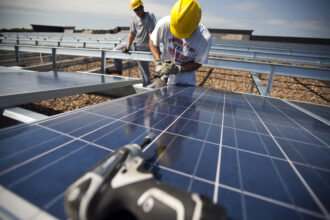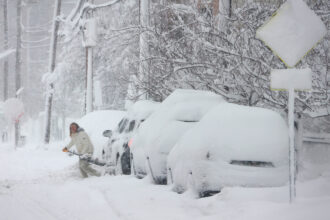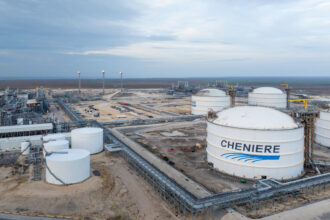This week on SolveClimate, we continued to follow closely the course of the American Clean Energy and Security (ACES) climate bill.
After months of negotiations and three hours of heated debate, the legislation squeaked through the House by a vote of 219 to 212 on Friday evening. Forty-four Democrats voted against it, while eight Republicans sided with the majority.
During the week leading up to the vote, the critically weakened bill drew praise from most of the big green groups. Except for Greenpeace and Friends of the Earth, who called on Congress to vote no and write a truly climate-protecting bill instead. Twenty of America’s top climate change scientists pleaded with lawmakers to toughen the ACES bill.
In other news, a study by the National Academy of Sciences confirmed unequivocally the serious threat posed to the climate by a class of "super greenhouse gases" called HFCs as their use skyrockets in the developing world. A group of island nations urged President Obama to regulate the hazardous HFCs under the Montreal Protocol.
NASA’s James Hansen and 28 activists got arrested while protesting mountaintop mining in West Virginia. Among the detained was Mike Brune, executive director of the Rainforest Action Network, who delivered a first-hand account of the experience.
Utah’s largest newspaper took the state’s soon-to-be governor to task for his climate science skepticism. In San Jose, thousands of rooftops could soon be covered in solar panels, courtesy of creative loaning practices.
Speaking of financing, Japan’s Nissan secured lucrative loans from the feds to make electric cars in job-hungry Tennessee. And Hunter Lovins of Natural Capitalism Solutions made the business case for climate protection to corporations.
We analyzed the potential of offshore wind energy to power the whole Eastern seaboard, and then some. We also told the tale of Christopher Swain. He’s on a 1,000-mile Atlantic swim to call out the impact of CO2 on the world’s oceans.
From Africa, a new study revealed that raising camels would be a better bet for farmers, as climate change makes growing crops increasingly impossible for some 20 million people. Lester Brown, founder of the Earth Policy Institute and Worldwatch Institute, detailed just how destructive storms will be in our warming world.
Todd Paglia, director of ForestEthics, divulged Canada’s plans to send its tar-sands sludge to America via new pipelines. Turns out, Secretary of State Hillary Clinton is the only person who can kill the polluting project.
Finally, Bill Becker, head of the Presidential Climate Action Project, called on Washington to tune into the fact that everything is connected to the climate problem — the economy, transportation, health care and national security.
About This Story
Perhaps you noticed: This story, like all the news we publish, is free to read. That’s because Inside Climate News is a 501c3 nonprofit organization. We do not charge a subscription fee, lock our news behind a paywall, or clutter our website with ads. We make our news on climate and the environment freely available to you and anyone who wants it.
That’s not all. We also share our news for free with scores of other media organizations around the country. Many of them can’t afford to do environmental journalism of their own. We’ve built bureaus from coast to coast to report local stories, collaborate with local newsrooms and co-publish articles so that this vital work is shared as widely as possible.
Two of us launched ICN in 2007. Six years later we earned a Pulitzer Prize for National Reporting, and now we run the oldest and largest dedicated climate newsroom in the nation. We tell the story in all its complexity. We hold polluters accountable. We expose environmental injustice. We debunk misinformation. We scrutinize solutions and inspire action.
Donations from readers like you fund every aspect of what we do. If you don’t already, will you support our ongoing work, our reporting on the biggest crisis facing our planet, and help us reach even more readers in more places?
Please take a moment to make a tax-deductible donation. Every one of them makes a difference.
Thank you,












